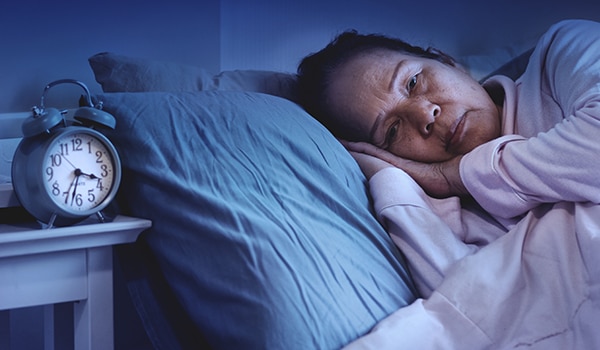Diabetes is a disease that affects your blood sugar levels and can lead to serious health problems. Unfortunately, diabetes also causes sleep problems, which can make managing your condition even harder. In this article, we’ll explore some of the common sleep problems that people with diabetes experience, and explain how to address them.
Contents
What Is Diabetes?
Diabetes is a disease in which the body doesn’t produce enough insulin, which helps to regulate blood sugar levels.
There are two main types of diabetes – type 1 and type 2. People with type 1 diabetes have to take insulin to control their blood sugar levels, while people with type 2 diabetes don’t. There’s also gestational diabetes, which is a form of diabetes that develops during pregnancy.
People with type 1 diabetes usually develop the disease when they’re young and don’t know how to control their blood sugar levels. They may experience episodes of high blood sugar (a diabetic coma) or even death if their blood sugar gets too high. Type 2 diabetes is more common and can develop at any age. It’s usually caused by obesity and a lack of exercise. As the disease progresses, it can lead to heart disease, stroke, kidney failure, blindness, and amputations.
The symptoms of diabetes can vary from person to person, but they generally include changes in urination, appetite, energy, and mood. In addition, people with diabetes may experience problems sleeping.
What Are Diabetes Sleep Problems?

Diabetessleep problems can include difficulty falling asleep, staying asleep, or experiencing frequent awakenings. Additionally, people with diabetes may experience more rapid eye movement (REM) sleep than those without the disease. This can lead to disrupted sleep patterns and an increased risk of developing diabetes-related complications.
The effects of diabetes on sleep can vary depending on the person’s type of diabetes, age, and other health conditions. However, common sleep problems associated with diabetes include:
- Difficulty falling asleep due to worry or stress
- Staying asleep due to a lack of rest or sound sleep habits
- Frequent awakenings due to nighttime blood sugar fluctuations or other symptoms of diabetes
Types of Diabetes Sleep Problems

There are a few different types of diabetes sleep problems and each one needs to be taken into account when trying to solve them. Here is a look at some of the most common issues:
1. Hypoglycemia unawareness: People with diabetes sometimes don’t realize when they have low blood sugar levels, which can cause them to feel tired even when their blood sugar is in range. This can lead to hypoglycemia unawareness, which is when you don’t know you have low blood sugar and end up feeling tired even when your blood sugar is normal.
2. Night sweats: Many people with diabetes experience night sweats, which are excessive amounts of sweat that come on at night. The sweat contains glucose, which can cause confusion and weight gain in people with diabetes because it causes them to eat more than usual.
3. Restless leg syndrome (RLS): Persons with RLS often have trouble sleeping because their legs feel restless and they cannot get them to stop moving. This can make it difficult to sleep, even if you are in bed all night.
4. Drowsiness: People with diabetes are often drowsy due to their medication or the fact that they have difficulty regulating their blood sugar levels. This can lead to difficulty sleeping, which in turn can lead to more drowsiness and further problems sleeping.
5. Daytime sleepiness: People with diabetes often have trouble staying awake during the day because they are tired from fighting off their diabetes or they are not getting enough sleep at night. This can lead to problems with concentration and making decisions, which can affect your work or school life.
6. Poor blood sugar control: If your blood sugar levels are uncontrolled, this can lead to a variety of problems, including poor sleep. uncontrolled blood sugar levels can also cause you to experience hunger pangs and weight loss.
7. Sleep apnea: Sleep apnea is a condition in which people stop breathing during sleep. This can cause people with diabetes to experience more frequent episodes of low blood sugar, and it can also lead to heart problems and other health problems. There are several things you can do to reduce your risk of developing sleep apnea, including getting regular exercise and avoiding tobacco smoke.
How Do Diabetes Sleep Problems Affect People?
People with diabetes have to pay close attention to their blood sugar levels and keep them under control during the day. This can be tough when you’re trying to sleep.
Here are some common diabetes sleep problems and how they can affect people:
-Insomnia: People with diabetes often have trouble falling asleep or staying asleep. This can be caused by stress, anxiety, or a lack of sleep hygiene habits, like sticking to a regular bedtime routine. Insomnia can also be due to hormone changes associated with diabetes, such as low blood sugar levels during the night.
-Sleep apnea: This condition is characterized by repeated interruptions in breathing during sleep. Sleep apnea is most common in people who are overweight or have other medical conditions that increase their risk for snoring. In people with diabetes, sleep apnea is often related to high blood sugar levels and reduced airflow through the nose during sleep. Apnea episodes can cause fatigue, mood swings, and even diabetic ketoacidosis (DKA), a life-threatening complication of uncontrolled blood sugar levels.
-Circadian rhythm disturbances: Changes in the body’s natural rhythm (known as circadian rhythm disturbances)are common in people with diabetes. These changes can make it harder for people to get a good night’s sleep.
-Diabetic neuropathy: Diabetes can damage the nerves that control blood sugar levels and other body functions. This can lead to reduced sensation in the feet and lower legs, which can make it difficult to fall asleep or stay asleep.
-Poor sleep quality: People with diabetes often have trouble falling asleep and staying asleep because their sleep is interrupted by frequent bouts of hypoglycemia (low blood sugar). Poor sleep quality can lead to fatigue, mood swings, and weight gain.
How Can You Prevent or Treat Diabetes Sleep Problems?

There are a few things you can do to help prevent or treat diabetes sleep problems. Many diabetes treatments can help improve blood sugar control and sleep. Some of the most common diabetes treatments that can help improve sleep include:
Weight Loss
One of the most common types of diabetes treatments that can help improve sleep is weight loss. If you are overweight, losing weight can help improve your blood sugar control and sleep.
Exercise
Exercise also can help improve blood sugar control and sleep. Also, Exercise not only helps to burn calories, but it also can help to improve blood flow and reduce inflammation. This can help to improve your overall health and may also help to improve your sleep quality.
Medications
There are a few medications that can help to improve diabetes sleep problems. Some of the most common diabetes medications that are helpful in improving sleep include:
Insulin drugs such as Humalog or Novolog insulin along with other diabetes treatments such as metformin, lifestyle modification, and exercise. These medications can help to lower blood sugar levels and improve people’s ability to get a good night’s sleep.
Glucagon-like peptide 1 (GLP-1) receptor agonists such as liraglutide or saxagliptin. These medications work by helping the body feel full after eating, which can lead to improved sleep patterns.
ACE inhibitors such as enalapril or lisinopril may also help improve sleep. ACE inhibitors work by blocking the action of angiotensin-converting enzyme (ACE), which can lead to improved blood sugar control and better sleep.
Avoid Caffine
Another common way to help prevent or treat diabetes sleep problems is to avoid caffeine. Caffeine can increase blood sugar levels and can lead to disrupted sleep. Limit your caffeine intake to morning tea, coffee, or the occasional energy drink.
Try to Avoid Stress
Another common way to help prevent or treat diabetes sleep problems is to try to avoid stress. Stress can lead to increased blood sugar levels and disrupted sleep. Try to find ways to relax and relieve stress each day. This can include things such as yoga, meditation, or taking a hot bath.
If you are struggling to get a good night’s sleep, please call our office for a consultation. Our team can help you to identify the best diabetes treatments that can help improve your sleep.
Conclusion
Diabetes is a common disease that can lead to several different sleep problems. In this article, we’ve discussed some of the most common issues and how to address them. Remember to make sure you are getting enough sleep and avoiding medications that can cause drowsiness. If you are struggling with any diabetic sleep problems, talk to your doctor about what might be causing them and what you can do to solve them.
Sleep problems are common in people with diabetes, and it’s important to address them so you can manage your condition effectively.
Hope this article was of help to you! If you are suffering from mental health disorders, you may seek help from Therapy Mantra. We have a team of highly trained and experienced therapists who can provide you with the tools and skills necessary for overcoming mental health disorders. Contact us today to schedule an online therapy, online diabetes treatment, online Diabetologist, or download our free Android or iOS app for more information.


